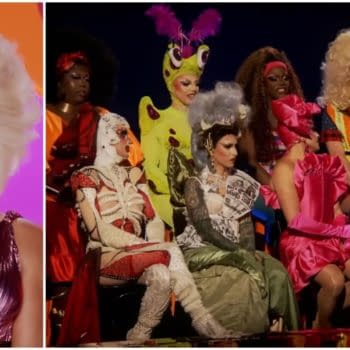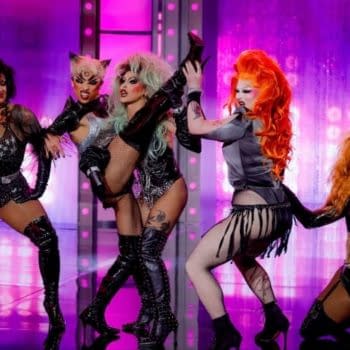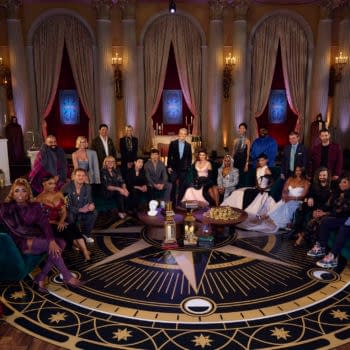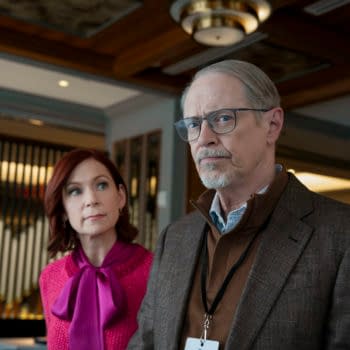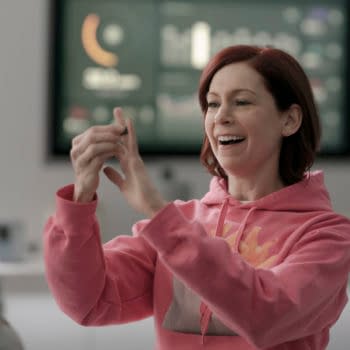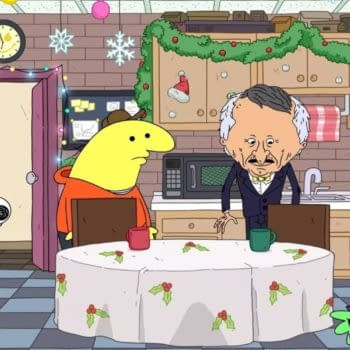Posted in: NBC, streaming, Trailer, TV, YouTube | Tagged: aaron sorkin, amerian horror story, bleeding cool, bradley whitford, cable, friends, HBO, Matthew Perry, newsroom, Sarah Paulson, streaming, studio 60, television, The West Wing, tv, west wing
Studio 60 on the Sunset Strip: In Praise of Some Sought-After Sorkin
I'm going to be bold with my opinions here and make a statement contrary to what most other critics say: Studio 60 on the Sunset Strip is an under-appreciated gem. So much so that unless you were paying attention to the 2006-2007 primetime lineup or happen to be an Aaron Sorkin groupie, you probably haven't seen it. And that's okay because I'm about to introduce you to the best Sorkin series this century. Even if you're familiar with it, it's worth giving it another look, because it ages like a beautiful barrel-aged scotch.
Yes, it's navel-gazing self-serving work from a narcissistic ego-centric writer who thinks himself to be the most clever man in the industry, but it's good. Is it perfect? No, but that's okay – nobody watches a Sorkin show for perfection, we watch them for punchy comebacks, social and political commentary, and as brief escapism into a world that's just a little bit prettier, shinier, and more polished than ours… and one that has better-looking presidents.
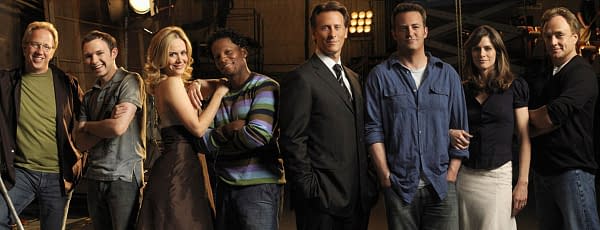
And what better thing to put a glossy coat of paint on than SNL? That's exactly what this is: in the "Sorkin Cinematic Universe", Studio 60 has SNL's place in pop culture and he's turned it into a witty drama series via the Network treatment. I read a complaint about the show from another critic who called it unrealistic because it was a preposterous notion to them that an L.A. comedy show was better than SNL. I think that's rather silly seeing as they're both equally pretentious. I also think it's ridiculous of them to discount a fictional reality for not matching our current reality.
This may come as a shock, but scripted shows are not reality. They can be different, even take place in a magic make-believe world that looks a lot like ours – but at the end of the day, there is basically zero representation of the world we live in as we live in it on our televisions in general. It's all fiction, even when it's presented as reality. So, get ready to put on your imagination hat and dive into the magical reality of Aaron Sorkin, boys and girls, because today we're exploring the exciting world of a live television broadcast.
Yes, it's basically a "how it should have gone" for life, but that's exactly what television and movies are. Aside from that, the show happens to be brilliant by virtue of satire and commentary on how a live comedy show is run. The perpetual advice I got all through school was to write what you know, and Sorkin excels at that because what does he know better than being a rigid atheist dating a proud Christian woman, the L.A. comedy scene, and writing a television show? I can tell you one thing for sure, it's not broadcast journalism or the inner workings of the White House.
That's what gives Studio 60 an edge – it's sincerity. Sorkin knows this world because it is very much the same one he made a name for himself in. He manages to put in his struggles with cocaine, his romantic partnerships turned work relationship, and the pressure to keep writing things that are more fantastic and wittier than the last project. Yeah, The Newsroom and West Wing and even Sports Night had elements of his truth in them – they wouldn't have been funny if they didn't – but where Studio 60 takes that and runs with it is its unique ability to take jabs at itself, and not in the annoying meta "oh look at me, I'm set in the Hollywood television industry" kind of way. It has a whole musical number early on all about being the very model of a modern network TV show, and it's actually funny. Studio 60 knows exactly what it's about as a show; it's in the one-liners and in the characters like the network exec who jokes about having a dual masturbation show in development when the network is accused of valuing ratings over quality.
I'm not saying writers can't explore territory outside of what they know but compare Studio 60 (2006) to The Newsroom (2012). I love them both, but honestly, Newsroom feels more polished, more perfect, and therefore more removed from reality, despite working itself around actual recent history news events. The shows do similar things – have a character in a position of power go on a tirade against their audience in the cold open, detail the power struggle behind a live broadcast with the network, writers, and on-camera talent, and show the people behind the scenes who make beloved shows happen. That last one is kind of his television trademark.
Having worked in a newsroom, I am a little harsher and biased for The Newsroom, but Studio 60 took thunder away from that by virtue of not only being first but by doing the same thing better. They didn't have to write in stories and situations that made conservatives look silly, Studio 60 took the public sentiment and just held a mirror up to society instead of having a middle-aged white guy in Hollywood lecture us about why and how America's big problem is Republicans. Good comedy and satire should be a reflection of the society it's parodying and leave the viewer to draw their own conclusions. I promise, Sorkin, modern audiences will get it, you don't have to take that mirror of satire and use it to instead beat them over the head with your message – I promise.
Long story short, Studio 60 doesn't lecture at its audience or pander to anyone really – it does what good television should: it takes complete fictional people and drops them in realistic situations and we watch how they react. That's it – no "eat your vegetables hour with Aaron Sorkin" or grand sweeping manifesto on why humanity is the plague and art is dead – just some charming 43-minute segments about people trying to make some funny television each week. Isn't that enough to expect from a show crushed to a single season by the writers' strike and an unappreciative network (thanks NBC) – hell, from any TV show for that matter?
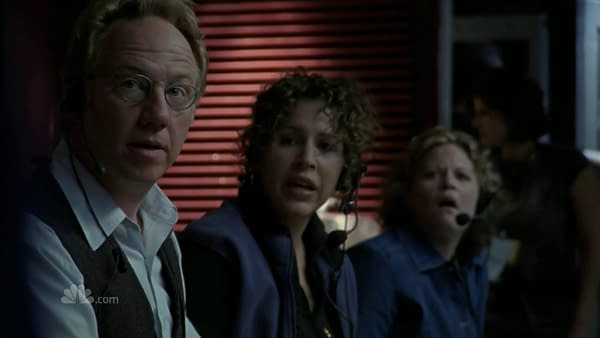
The fact it was great despite only getting 22 episodes is surprising, especially given its popularity with viewers – more so to us looking back on it 14 years later. If the strike hadn't happened, I wonder if we would have even gotten The Newsroom at all; think about it: if Studio 60 got additional seasons, let's say a respectable 3 or maybe even 4, would Sorkin have felt that the niche for workplace drama behind the scenes at a live television show was lacking? Likely not. Sadly, some subtlety was lost in the years between the two shows, but that just serves to make Studio 60 on the Sunset Strip all the more appreciated for how it got things right – and in the Bush administration, no less.





